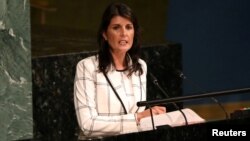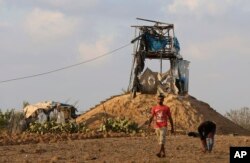U.S. Ambassador Nikki Haley has blasted Arab and Muslim states for offering rhetoric on the Palestinian situation while not taking more concrete action to alleviate humanitarian suffering and support the peace process.
Haley told the U.N. Security Council on Tuesday that "talk is cheap" and called out many countries, including U.S. allies Kuwait, Turkey and the United Arab Emirates, for their lack of or small contributions to the U.N. Relief and Works Agency for Palestine Refugees in the Near East, known as UNRWA.
"Last year, Iran's contribution to UNRWA was zero. Algeria's contribution to UNRWA was zero. Tunisia's contribution to UNRWA was zero," Haley said. "Other countries did provide some funding. Pakistan gave $20,000. Egypt gave $20,000. Oman gave $668,000."
She also called out China and Russia, which provided $350,000 and $2 million, respectively.
"Last year, while Algeria was providing nothing to UNRWA, and Turkey was providing $6.7 million, the United States gave $364 million," Haley said. But she did not mention that in January the Trump administration slashed its 2018 funding by $300 million, leaving UNRWA in an unprecedented financial crisis.
Emergency sessions
Since then, the agency has held two emergency pledging conferences and raised $238 million, but it still faces a $217 million shortfall and has warned that it may have to delay the start of the September school year. UNRWA schools educate more than a half-million children in the Palestinian territories and across the region.
“You cannot come to the Security Council in an arrogant way and say you are the only one helping and others aren’t doing anything -- that’s not the case,” Palestinian envoy Riyad Mansour told reporters. “If they care about the humanitarian situation of the Palestinian refugees, especially the 1.2 million in Gaza, you do not stop $300 million away from UNRWA under any pretext.”
Several envoys took issue with Haley’s comments, including Saudi ambassador Abdullah al-Moallemi, who said in the past year his government has given $100 million to UNRWA – half of that came after the U.S. funding cut to help make up the shortfall. While China’s ambassador Ma Zhaoxu said Beijing is making an additional $2 million contribution to UNRWA this year.
“In this regard, China has always been doing what we believe we should do and what we are capable of doing,” Ma told council members. “We have no intention of competing with any other countries,” he added.
Haley also chided Arab countries for not condemning Hamas and not supporting compromises that are necessary for peace.
"If they really cared about the Palestinian people, they would not do that," Haley said. "Instead, they would condemn extremism and they would put forth serious ideas for compromises that could end this struggle and lead to a better life for the Palestinian people."
In 2002, Arab leaders did put forward a plan known as the Arab Peace Initiative that called for normalizing relations between Arab states and Israel in exchange for Israel's full withdrawal from the occupied territories, including East Jerusalem, and settlement of the refugee issue.
It has been met with mixed reaction. The Palestinian Authority welcomed the plan, but Hamas, which controls Gaza, did not. On the Israeli side, support for the proposal has run the gamut from rejection to tentative support over the years.
Haley also said the Palestinian Authority looks “foolish” for dismissing the anticipated U.S. peace plan before they have even seen it.
Palestinian envoy Mansour said his government is not interested in any U.S. proposal because the status of Jerusalem is off the table, UNRWA is being “destroyed” through U.S. funding cuts, Jewish settlements “are more or less acceptable” and the two-state solution is fading.
“So if you have that kind of behavior that is being exhibited by the U.S. administration, what is left on the table?” Mansour asked. “That’s why we don’t want to engage in something that is useless because all the things that they’ve announced unilaterally are things that will not pave the way for peace and progress.”
Gaza on the brink
Meanwhile, the U.N. warned that tensions between Israel and Hamas were at the highest levels since the 2014 Israel-Gaza war.
"Over the last two weeks, however, the situation quickly spiraled out of control, nearly to a point of no return," said U.N. Special Coordinator for the Middle East Nickolay Mladenov. "I reiterate my call to all in Gaza to step back from the brink; those who seek to provoke Israelis and Palestinians to war must not succeed."
In the past month, Mladenov said 19 Palestinians, including seven children, were killed by the Israel Defense Forces in Gaza and one in the West Bank. An IDF soldier was killed by gunfire from Gaza, and four Israeli civilians and a soldier were wounded.
Tensions are also rising between Israel and Syria. Earlier Tuesday, Israel shot down a Syrian fighter jet it said had crossed 2 kilometers into its territory.





